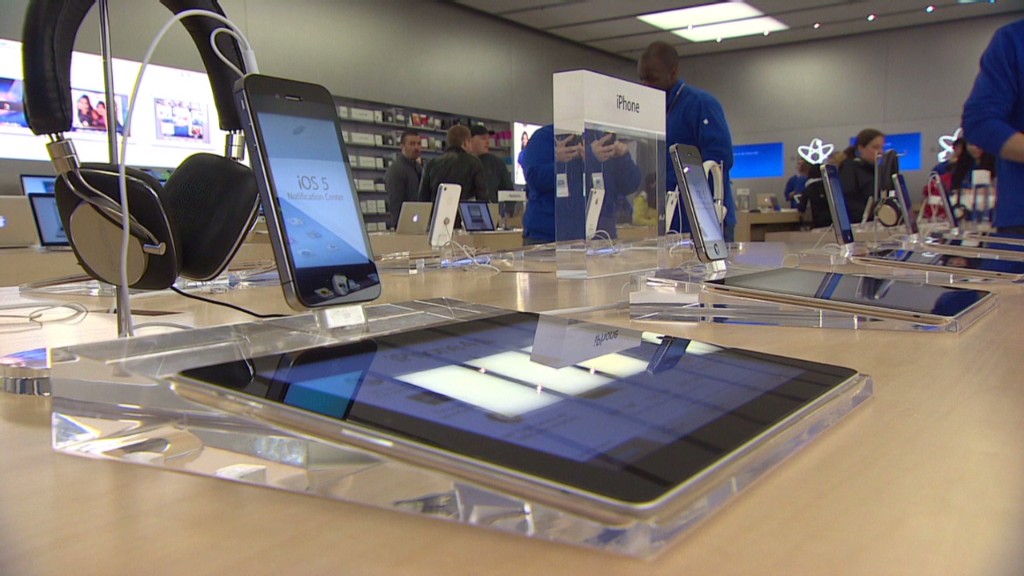
Apple will hold its first major product event in nine months on Monday, a stunning gap for a company that relies on regularly impressing customers with new innovations.
At its Worldwide Developers Conference in San Francisco, Apple (AAPL) is expected to unveil an update to its iOS mobile operating system, a new "iRadio" streaming music service, a refreshed MacBook lineup and potentially an Apple TV update.
For a company that's had such an amazing track record of successful product launches over the past decade, that lineup feels a bit dull -- particularly considering the long wait since CEO Tim Cook last took the stage.
At most companies, a year without a major new product release isn't cause for panic. But Apple isn't most companies.
Unlike more diversified tech competitors that sell everything from big data software to cloud solutions to servers, Apple gets 91% of its revenue from just four products: the iPhone, iPad, Macintosh computers, and the iPod. If you throw in app and music sales from the iTunes App Store, that share goes up to 96%.
Related story: Apple's profit problem
The problem with that business model is that it forces Apple to constantly come up with a groundbreaking new product. Apple has done a remarkable job at that: The iPod, iPhone and iPad have all defined their product category.
But competitors have eventually caught up to Apple, offering alternatives that look and perform just as well -- if not better. It happened with the iPhone, and it's beginning to happen with the iPad and Macintosh. The only product that didn't fall into that trap was the iPod, which was insulated by Apple's proprietary iTunes software and store. If anything, you can argue that Apple itself killed the iPod with the iPhone.

"Historical industry patterns show us that as products improve and become 'good enough' for mainstream use, it becomes more difficult to create a strong value proposition by making a better product," said Sameer Singh, head analyst at BitChemy Ventures, a technology incubator. He argues that makes it more difficult for a company to sell something that is a lot more expensive than a rival's similar product.
That is playing out right now with Apple. Today, there are far fewer differences between the top-of-the-line iPhone 5 and a run-of-the-mill Google (GOOG) Android smartphone than at any point in the iPhone's six-year history. By offering eerily similar and cheaper alternatives, Android manufacturers have surpassed Apple in market share, and iPhone sales growth is starting to slow.
Though Apple maintains a "profit share" advantage over archrival Samsung in the smartphone space, even that is beginning to erode.
Similarly, Intel's (INTC) ultrabooks are pressuring the Mac lineup, as sales in Apple's PC division have stagnated in recent quarters. Android tablets also recently overtook the iPad.
There are ways out of the corner Apple has backed itself into, but only one of them seems remotely "Apple-like."
The first is by diversifying IBM (IBM)-style, but that has never been Apple's modus operandi. Another is for Apple to gun for the market share lead by opening its products for use by other companies in the way that Microsoft (MSFT)and Google have done. But that too is the antithesis of what Apple has stood for since the 1980s.
The last, and "the riskiest approach," according to Singh, is to keep creating and delivering market-disrupting innovations. Apple has long been rumored to be working on an "iTV" all-in-one television set. More recently, the company is said to have been developing an "iWatch."
Still, it's a tall order to ask Apple to continue its unprecedented run of success.
Ironically, Apple founder Steve Jobs warned of the folly of seeking profits over market share.
"They made outlandish profits for about four years," Jobs said in his famous "Lost Interview" from 1995, discussing Apple's Macintosh strategy at the time. "What this cost them was their future. What they should have been doing is making rational profits and going for market share."
Apple became the world's most valuable company by generating legitimate consumer excitement for its iGizmos. It transformed itself from a niche company in the computer world to one that created entirely new categories of gadgets.
If it can't do that again soon, Apple could be in big trouble.

